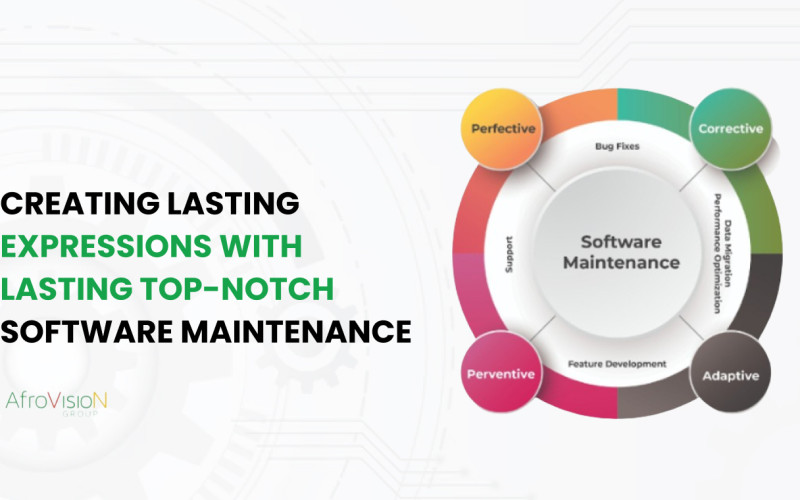Importance of Software Maintenance and Support for Long Term Success.

Are you a founder, developer, quality assurance tester, social media manager, student, or just a tech enthusiast? You have interacted with a software application at one point in your life, and imagine in the middle of using that software, it breaks (freezes, logs you out, displays a different UI, etc). That automatically paints the owner of that software in a not-so-good light. That is where Software Maintenance and support comes in.
Wiki says Software maintenance in software engineering is the modification of a software product after delivery to correct faults, and improve performance or other attributes. Software maintenance focuses on modifying the existing software code to address issues faced, improving functionalities, and keeping the app up-to-date.
Software support on the other hand provides ongoing technical assistance to users of the software including but not limited to answering user questions, providing documentation and training,
Some benefits of software maintenance and support are:
- Improved software quality: Helping to identify bugs and fix bugs early on leads to a more stable and reliable software product
- Cost Maintenance: maintaining software applications throughout their lifecycle is often more cost-effective than starting from scratch. This is especially true when considering the reusability and scalability of existing software assets. By prioritizing software maintenance, businesses can optimize their financial resources and achieve long-term cost efficiency.
- Increased ROI: A stable product maximizes the return on investment because of an extended lifespan.
- Improved User experience: With ready technical support for users and the proactive goal of preventing future problems, users are less likely to face an issue with the software if not ever.
- Enhanced innovation: A well-maintained software product allows the developers to focus on other innovative products and new features instead of constantly fixing bugs or addressing outdated functionalities
- Improved compliance with Security: With the strict regulations regarding data security and privacy, regular maintenance ensures the software remains compliant with these data regulations and avoids potential legal issues.
Types of software maintenance:
- Preventive maintenance: This involves regular activities to identify and address potential issues before they escalate into major problems.
- Predictive maintenance: This leverages data analytics and monitoring tools to predict potential problems before they occur.
- Perfective maintenance: This focuses on improving the overall quality, usability, and maintainability of the software.
- Corrective maintenance: This involves developers fixing bugs and issues reported by users after they occur.
- Adaptive maintenance: This involves modifying the software to adapt to new requirements, technologies, or business needs
Outsourcing Software Maintenance and Support
Outsourcing software maintenance refers to giving control of your code base to external specialized service providers to handle the upkeep and support of your software product. With the expertise of the service providers, their industry best practices, and dedicated resources, organizations can ensure their software remains relevant, scalable, and compatible with future environments.
By partnering with trusted IT professionals, businesses can focus on core activities while leveraging external knowledge to ensure the ongoing success of their software. Outsourcing software maintenance offers flexibility and expertise, positioning organizations for long-term growth and innovation in the ever-changing digital landscape. This enables businesses to adapt to emerging technologies and industry standards.
Advantages of Software maintenance outsourcing:
- Cost Savings: Outsourcing companies often have lower costs and access to a wider talent pool compared to hiring in-house staff.
- Improved Efficiency: Outsourcing maintenance tasks enables your in-house developers to focus on core development activities and new feature creation, increasing overall team efficiency.
- Scalability: Outsourcing companies can easily scale their resources to meet your fluctuating maintenance needs offering greater flexibility.
- Access to Best practices: Outsourcing companies stay updated on the latest industry best practices for software maintenance, bringing valuable expertise to your project.
Disadvantages of Software maintenance outsourcing:
- Loss of control: When you outsource maintenance, you relinquish some degree of control over the development process.
- Potential security risks: Thorough vetting of outsourcing companies and implementing robust security protocols are essential to reduce potential security risks.
- Vendor dependence: Overdependence on a single outsourcing vendor can leave you vulnerable if the partnership dissolves or the outsourcing company’s quality of service declines.
The decision to outsource software maintenance depends on your specific needs and resources. Consider factors like the complexity of your software, budget constraints, in-house skills availability, and your risk tolerance. By carefully evaluating the advantages and disadvantages and implementing strategies to mitigate potential risks, outsourcing can be a valuable option for optimizing your software maintenance processes and maximizing cost-effectiveness.
In conclusion, Software maintenance and support are essential for ensuring the long-term success of any software product. And by investing in these services, businesses can keep their software running smoothly, meet their user’s needs and maintain a competitive edge.
Need software maintenance and support service for your product? AfroVisioN got you! With our experience, expertise, and affordable rates starting as low as 500$, we offer you the best software maintenance and support service in the country. Learn more here www.hire.afrovisiongroup.com